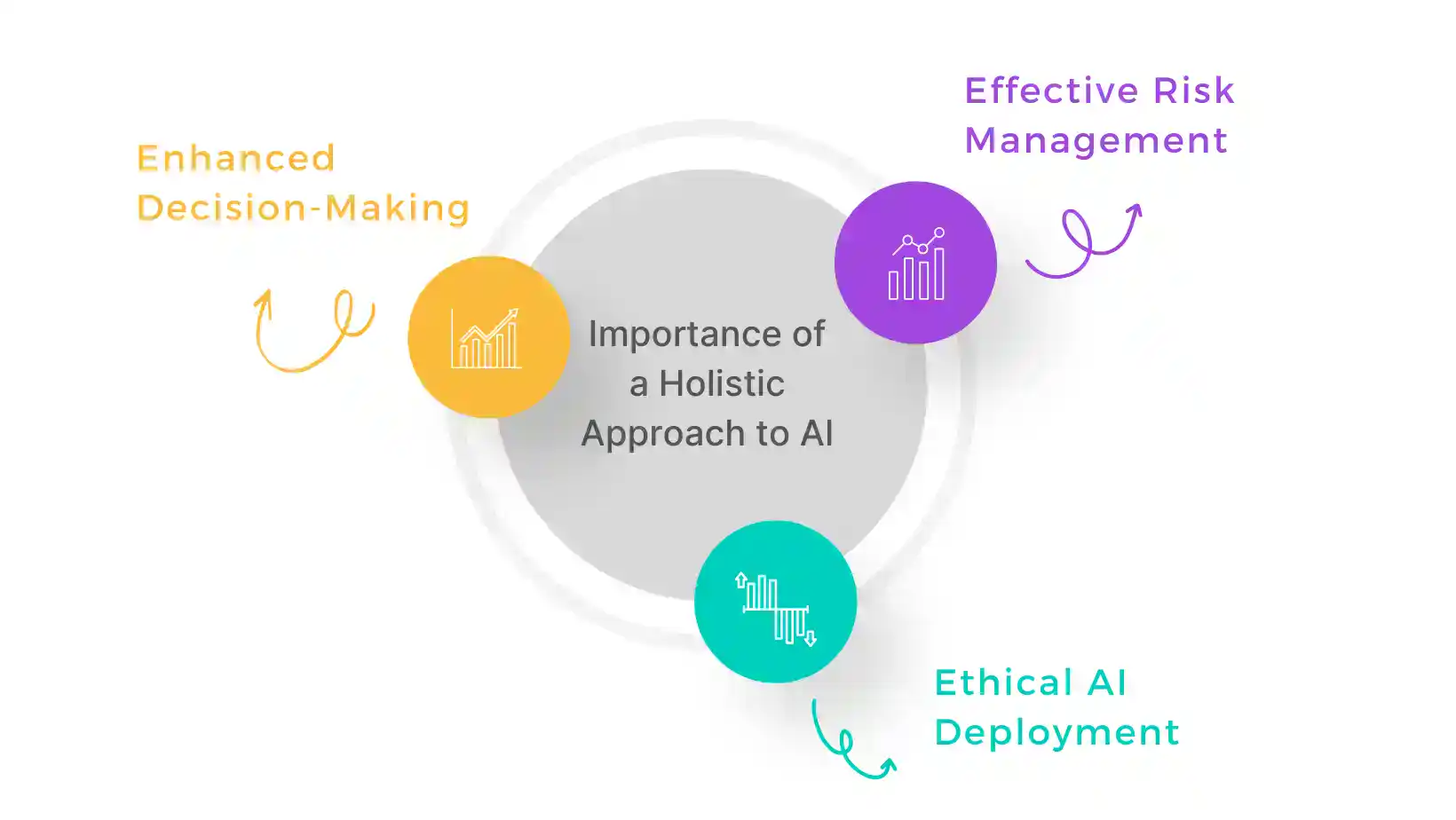Table of Contents
Introduction
The advent of artificial intelligence (AI) has revolutionized industries, altering the landscape of business operations and decision-making processes. As AI continues to advance, it becomes critical for businesses to adopt a holistic approach to its application. This ensures the responsible and effective utilization of AI, aligning it with organizational goals and values. This blog post explores the nuances of a holistic approach to AI, its significance, and operational mechanics, and dispels common myths surrounding this technology.
What Does a Holistic Approach to AI mean?

The term “holistic” in AI implies an all-encompassing, integrated approach that goes beyond the mere application of algorithms and data processing. A holistic approach to AI integrates diverse aspects like data, analysis, decision-making, ethics, and risk management for comprehensive solutions. This methodology requires a multidimensional perspective, enveloping every facet of AI implementation and its influence on the business as a whole. Let’s delve deeper into what this truly entails:
Comprehensive Data Gathering and Utilization
In a holistic AI approach, data gathering is not just about amassing large volumes of data. It’s about collecting diverse, quality data that reflects various aspects of the business and its environment. This includes customer data, operational metrics, market trends, and even socio-economic factors. By embracing a wide-ranging data collection strategy, AI systems can provide more accurate, nuanced insights.
Integrated Analysis for Deeper Insights
Holistic AI involves integrating data from disparate sources and analyzing it to uncover deeper insights. This means breaking down silos within the organization and ensuring that AI systems can access and interpret data across different departments and functions. Such integration leads to a more comprehensive understanding of the business challenges and opportunities. For organizations looking to develop such capabilities, partnering with an ai software development company can provide the necessary expertise and technological support.
Informed Decision-Making
In a holistic AI framework, decision-making is informed by a complete view of the business landscape. AI doesn’t just provide answers; it offers insights that align with the company’s strategic goals. This can range from operational decisions, like inventory management, to strategic moves, like entering new markets, increasing call conversions, or developing new products.
Risk Management and Ethical Considerations
A key component of the holistic approach is the proactive management of risks associated with AI, including ethical considerations. This involves evaluating the potential impacts of AI decisions on various stakeholders, including customers, employees, and the broader community. It also means ensuring that AI systems are transparent, fair, and free from biases and that they comply with legal and regulatory standards.
Aligning with Business Values and Objectives
At its core, a holistic AI strategy aligns with the broader objectives and values of the business. It’s not just about harnessing AI for efficiency and profitability; it’s about integrating AI in a way that supports the company’s mission, vision, and ethical standards. This includes using AI to drive sustainable practices, enhance customer experiences, and foster an innovative, inclusive workplace culture.
Continuous Learning and Evolution
Finally, a holistic AI approach is dynamic and adaptive. It involves continuously learning from new data, adapting to changing market conditions and evolving based on feedback and results. This ongoing process ensures that AI applications remain relevant, effective, and aligned with the company’s long-term strategic goals.
By embracing this comprehensive, integrated approach, businesses can ensure that their AI initiatives are not just technologically advanced, but also strategically aligned, ethically responsible, and dynamically adaptive. This holistic view of AI is what sets apart truly transformative AI implementations from mere technological deployments.
Importance of a Holistic Approach to AI

Enhanced Decision-Making
Holistic AI fosters a multi-dimensional view of data analysis, leading to more informed, strategic decisions. This comprehensive data analysis helps identify patterns and insights that might be overlooked in a more narrow approach.
Effective Risk Management
A comprehensive AI strategy helps in recognizing and mitigating potential risks associated with AI, including data breaches, algorithmic biases, and unintended consequences.
Ethical AI Deployment
Adopting a holistic approach ensures AI systems are developed and utilized in ways that reflect the company’s ethical standards, helping avoid moral dilemmas and negative public perception.
How Does Holistic AI Function?
The functionality of holistic AI can be likened to a well-orchestrated symphony, where each element plays a crucial role, and their harmonious integration creates a powerful outcome. Let’s break down this integration process:
Multi-Dimensional Data Collection and Integration
The first step in holistic AI is gathering a diverse array of data. This is not limited to quantitative data but also includes qualitative insights, providing a well-rounded view of the business landscape. The integration of these varied data sets is crucial. Holistic AI systems are designed to handle and synthesize data from multiple sources – be it internal databases, customer feedback, market trends, or even global economic indicators.
Advanced Analytics and Insight Generation
Once the data is integrated, advanced analytical tools come into play. These tools utilize various AI methodologies like AI software development, machine learning, natural language processing, and predictive analytics to extract meaningful insights. This process goes beyond conventional data analysis, identifying hidden patterns, predicting future trends, and providing strategic foresight into business operations.
Decision Support Systems
In a holistic AI framework, decision support systems play a pivotal role. They take the insights generated from data analysis and present them in an actionable format. These systems help decision-makers understand the potential impact of various choices, offering a range of scenarios and outcomes based on different inputs. This aspect of holistic AI ensures that decisions are data-driven, strategically sound, and aligned with business objectives.
Risk Assessment and Mitigation
Risk management is an integral part of holistic AI. The system continually assesses potential risks – from operational challenges to ethical and compliance issues. By identifying these risks early, AI can provide recommendations for mitigation, helping businesses avoid or minimize negative impacts.
Ethical and Compliance Alignment
Holistic AI systems are designed with a strong emphasis on ethical considerations and regulatory compliance. They are programmed to adhere to ethical guidelines and legal standards, ensuring that AI-driven decisions are not only smart but also responsible and compliant with industry norms and societal values.
Continuous Learning and Adaptation
A defining feature of holistic AI is its ability to learn and adapt. These systems are not static; they evolve based on new data, feedback, and changing business environments. This continuous learning process ensures that the AI remains effective and relevant, adjusting its algorithms and insights to align with current trends and organizational changes.
Integrated Feedback Loop
Finally, an integrated feedback loop is crucial in a system where there is a Holistic Approach to AI. This involves monitoring the outcomes of AI-driven decisions and actions, gathering feedback, and using this information to refine and improve the AI models. This feedback loop ensures that the AI system is responsive to real-world results and can adapt its strategies for better outcomes in the future.
In essence, the functionality of a holistic approach to AI is not just about implementing advanced technology; it’s about creating a seamless interaction between technology, data, human decision-making, and strategic business objectives. This approach ensures that AI is not operating in a vacuum but is deeply embedded in the fabric of the organization, contributing to its overall growth, sustainability, and competitive edge.
Related Article
Debunking Myths: Common Holistic AI Misconceptions
Dependence on Advanced Computer Hardware
Contrary to popular belief, holistic AI transcends the realm of sophisticated computer hardware. While hardware is important for data processing and storage, the core of holistic AI lies in the integration of various AI components into a comprehensive solution.
Complexity
The complexity of holistic AI is often overstated. Though it involves intricate algorithms and data analyses, there are tools and interfaces designed to simplify its management and implementation for businesses.
Exclusivity to Large Corporations
Holistic AI is mistakenly seen as suitable only for large organizations. However, it is beneficial for businesses of all sizes, allowing them to align AI capabilities with their unique objectives and values.
A Passing Trend
Some view holistic AI as a fleeting trend. In reality, AI is a fundamental aspect of our technological future, and a holistic approach is vital for businesses to stay competitive in an AI-centric world.
Case Studies: Holistic AI in Action
Retail Sector
In the retail sector, a holistic approach to AI has revolutionized inventory management and customer service. By analyzing customer data and purchasing patterns, retailers can predict trends, manage stock levels efficiently, and personalize customer experiences, leading to increased satisfaction and loyalty.
Healthcare Industry
In healthcare, AI’s holistic application aids in patient diagnosis and treatment plans. By aggregating patient data, medical history,
and current research, AI systems can provide comprehensive insights for personalized patient care, significantly improving treatment outcomes and operational efficiency.
Financial Services
In finance, a holistic approach to AI is used to enhance risk management, fraud detection, and customer service. By analyzing large volumes of transaction data, AI can identify potential fraud patterns and flag anomalies, while also personalizing financial advice for customers based on their spending habits and financial histor
Aligning AI with Business Ethics and Sustainability Goals
Ensuring Responsible AI Use
A holistic approach to AI involves ensuring that AI systems are used responsibly. This includes addressing ethical concerns like privacy, data security, SOC 2 compliance, ISO Compliance and bias in AI algorithms. By prioritizing these ethical considerations, businesses can build trust and maintain a positive public image.
Sustainable AI Practices
Aligning AI with sustainability goals means using AI to support environmentally friendly business practices. This Holistic Approach to AI includes optimizing supply chains for reduced carbon footprint, using AI for energy-efficient operations, and employing AI in the development of sustainable products and services.
Conclusion
Embracing a holistic approach to AI is not just about leveraging new technology; it’s about integrating AI into the very fabric of business operations and strategy. This approach ensures that AI is aligned with a company’s goals, ethical standards, and risk management strategies. By understanding the holistic approach, debunking common myths, and utilizing appropriate tools and resources, businesses can effectively navigate the AI revolution. This comprehensive strategy guarantees not only keeping pace with technological advancements but also capitalizing on the vast opportunities AI presents. In an increasingly AI-centric world, a holistic approach to AI is essential for businesses aiming to harness its transformative power effectively and responsibly.
Related Article